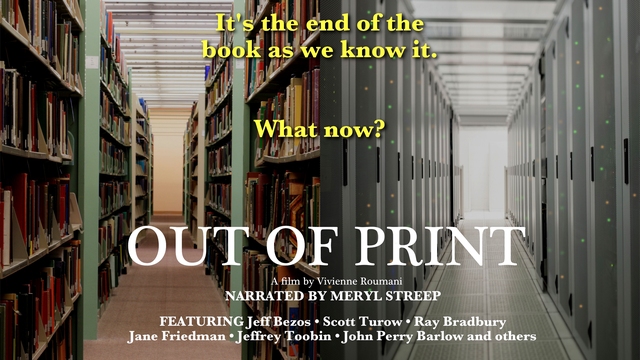Out of Print
How the digital revolution is killing books.
 Dive into the riveting debate over the future of ideas. To some, the digital revolution can offer an extraordinary gift to humanity: unfettered access to all published content. The other side defends copyright as indispensable in ensuring that the best minds commit their energy and time to the written word. This documentary visits the libraries, book clubs, classrooms and corporate offices on the frontline of this fight, to give the whole story.
Dive into the riveting debate over the future of ideas. To some, the digital revolution can offer an extraordinary gift to humanity: unfettered access to all published content. The other side defends copyright as indispensable in ensuring that the best minds commit their energy and time to the written word. This documentary visits the libraries, book clubs, classrooms and corporate offices on the frontline of this fight, to give the whole story.


 "We co-evolve with our tools. Certainly the book has probably changed us more than any other tool", Jeff Bezos, founder and CEO of Amazon.com, argues. So what does it mean when our most important tool for the last 500 years disappears? The worry is that a future without books may be a dark one. "Our children I think are lurching from one entertaining piece of information to the next; they aren't learning how to think."
The digital shift has created angry confrontations across the publishing industry, as Amazon and traditional publishers engage in a bitter struggle. Scott Turow, President of the Authors Guild, claims Amazon are intentionally destroying physical bookstores and therefore harming authors. "If you destroy the physical bookstore by allowing predatory pricing it's going to be much harder for new authors to get a foothold." Amazon take a very different view: "We have made it easier for people to find that hard to find books, so it has increased the diversity of availability".
But as the argument rages over changes in the industry the real looming question is whether the problems of the publishing industry are because of technology or because people just don't read books anymore. "I think there has been a shift over the last 20 years away from long form reading towards short form reading", Jeff Bezos says. According to one student, for the next generation it has become all about instant rather than deep information. "I Google the answer, I am not sitting there reading the little details."
But as the world frets over changing business models and new ways of consuming information, ultimately one thing remains unchanged. "What matters is the intellectual engagement, not the technology." So whether it is a medieval manuscript or a tablet, the key is to keep people reading. "If you can expose the student to a world of books then that student will forever get it and continue to read."
Narrated by Meryl Streep
LEARN MORE.
"We co-evolve with our tools. Certainly the book has probably changed us more than any other tool", Jeff Bezos, founder and CEO of Amazon.com, argues. So what does it mean when our most important tool for the last 500 years disappears? The worry is that a future without books may be a dark one. "Our children I think are lurching from one entertaining piece of information to the next; they aren't learning how to think."
The digital shift has created angry confrontations across the publishing industry, as Amazon and traditional publishers engage in a bitter struggle. Scott Turow, President of the Authors Guild, claims Amazon are intentionally destroying physical bookstores and therefore harming authors. "If you destroy the physical bookstore by allowing predatory pricing it's going to be much harder for new authors to get a foothold." Amazon take a very different view: "We have made it easier for people to find that hard to find books, so it has increased the diversity of availability".
But as the argument rages over changes in the industry the real looming question is whether the problems of the publishing industry are because of technology or because people just don't read books anymore. "I think there has been a shift over the last 20 years away from long form reading towards short form reading", Jeff Bezos says. According to one student, for the next generation it has become all about instant rather than deep information. "I Google the answer, I am not sitting there reading the little details."
But as the world frets over changing business models and new ways of consuming information, ultimately one thing remains unchanged. "What matters is the intellectual engagement, not the technology." So whether it is a medieval manuscript or a tablet, the key is to keep people reading. "If you can expose the student to a world of books then that student will forever get it and continue to read."
Narrated by Meryl Streep
LEARN MORE.
JOIN THE DISCUSSION.
 Official Selection, Tribeca International Film Festival, 2013
Official Selection, Tribeca International Film Festival, 2013





